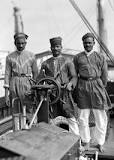※カラフル対訳で紹介している作品はすべてパブリックドメインです。
このサイトで使われている作品のすべては著作権の切れた名作などの全文を電子化して、インターネット上で公開しているProject Gutenberg(プロジェクト・グーテンベルク)、LibriVox(リブリヴォックス、朗読図書館)の作品を出典としています。
翻訳者:中務秀典
カラフル対訳
Once on a dark winter’s day, when the yellow fog hung so thick and heavy in the streets of London that the lamps were lighted
あるうす暗い冬の日、ロンドンの街に黄色い霧が深く重く垂れこめていたため、ランプが灯り、
and the shop windows blazed with[~を用いて] gas as they do[まさに~と同じように] at night,
店の窓には夜のようにガス灯が赤々と燃えていた。
an odd-looking little girl sat in a cab with her father and was driven rather slowly through the big thoroughfares.
風変りな外見の少女が父親と一緒に馬車に座って、大通りをゆっくりと進んでいた。
She sat with her feet tucked[押し込んで] under her, and leaned against her father, who held her in his arm,
少女は足を下に入れて座り、腕で彼女を抱いている父親にもたれかかっていた。
as she stared out of the window at the passing people with a queer[奇妙で] old-fashioned thoughtfulness in her big eyes.
窓の外を通りすぎる人々をじっと見つめていた。少し変わっていて古風で、思慮深げなその大きな瞳で。
She was such a little girl that one did not expect to see such a look on her small face.
彼女のような小さな女の子が、小さな顔にそのような表情を見せることは、誰も予想できないでしょう。
It would have been an old look for a child of twelve, and Sara Crewe was only seven.
その女の子が12歳の子供だったとしても大人びた外見だと言えるでしょうが、セーラ・クルーはまだ7歳でした。
The fact was, however, that she was always dreaming and thinking odd things
でも実際のところ、セーラはいつも奇妙なことを夢見たりや考えたりしていて、
and could not herself remember any time when she had not been thinking things about grown-up people and the world they belonged to.
自分でも、大人たちや大人たちが属している世界のことを考えていなかったときのことを思い出すことができなかった。
She felt as if she had lived a long, long time.
彼女は、長い長い時間を生きてきたような気がしていた。
At this moment she was remembering[思い出す] the voyage she had just made from Bombay with her father, Captain Crewe.
この時、セーラは父親のクルー大尉と一緒にやって来たボンベイからの航海のことを思い出していた。
She was thinking of the big ship, of the Lascars[東インドの水夫] passing silently to and fro on it, of the children playing about on the hot deck,
大きな船のことを考え、船の上を静かに行ったり来たりしていたラスカー、 熱いデッキで遊んでいた子供たち、
熱いデッキで遊んでいた子供たち、
and of some young officers’ wives who used to try to make her talk to them and laugh at the things she said.
若い将校の奥さんたちがよくセーラにお話をさせようとし、彼女の話すことを聞いて笑ったことなどを考えていた。
Principally,[主として] she was thinking of what a queer thing it was that at one time[ある時] one was in India in the blazing sun,
専ら、彼女はこれはどんなに奇妙なことなんだろうと考えていた。かつてはインドの焼けつくような炎天下にいたかと思うと、
and then in the middle of the ocean, and then driving in a strange vehicle through strange streets where the day was as dark as the night.
次には、大洋の真ん中にいて、それから昼間でも夜のように暗い奇妙な街並みを奇妙な乗り物に乗って通り抜けている。
She found this so puzzling that she moved closer to her father.
このことが彼女をとても困惑させ、セーラは父親に近づいていった。
“Papa,” she said in a low, mysterious little voice which was almost a whisper, “papa.”
「パパ」ほとんどささやくような、低くて神秘的な小さな声で、セーラは言った。「パパ」
“What is it, darling?” Captain Crewe answered, holding her closer and looking down into her face.
「どうしたんだい、セーラ?」 クルー大尉は答え、彼女を抱き寄せて顔を覗き込んだ。
“What is Sara thinking of?”
「何を考えているんだい?セーラ」
“Is this the place?” Sara whispered, cuddling still closer to him. “Is it, papa?”
「ここがその場所なの?」さらに一層ぴったりと父親を抱きしめながらセーラはささやいた。「ここなの?パパ」
“Yes, little Sara, it is. We have reached it at last.” And though she was only seven years old, she knew that he felt sad when he said it.
「そうだよ、かわいい私のセーラ。やっと着いたね」セーラはまだ7歳だったけれど、お父さんがそう言った時、悲しんでいることに気づいた。
It seemed to her many years since he had begun to prepare[~を準備する] her mind for “the place,” as she always called it.
セーラにはもう何年も経っているように思えるほど前から、父は彼女がいつも「あの場所」と呼んでいる場所に対しての心の準備をさせていた。
Her mother had died when she was born, so she had never known or missed her.
母親は生まれた時に亡くなったので、セーラはお母さんのことを知らなかったし、寂しく思うこともなかった。
Her young, handsome, rich, petting father seemed to be the only relation[親族関係] she had in the world.
若く、ハンサムで、お金持ちで、愛情深い父親だけが、セーラにとって世界でただ一人の家族のようだった。
They had always played together and been fond of each other.
二人はいつも一緒に遊んでいたし、お互いが大好きだった。
She only knew he was rich because she had heard people say so when they thought she was not listening,
セーラが父親が金持ちだと知っていたのは、彼女が聞いていないと思って人々がそう言うのを聞いたことがあるからだった。
and she had also heard them say that when she grew up she would be rich, too.
そして、セーラも大人になったらお金持ちになるだろうという話も聞いたことがあった。
She did not know all that[~に関する一切のこと] being rich meant.
セーラにはお金持ちとはどういうことかよく分からなかった。
She had always lived in a beautiful bungalow,
彼女はいつも美しいバンガロー に住んでいて、
に住んでいて、
and had been used to seeing many servants who made salaams to her and called her “Missee[missy] Sahib,” and gave her her own way[自分のやり方, 自分の道] in everything.
彼女にサラーム[体をかがめ右の手のひらを額に当てて行なう敬礼]をして『お嬢様』と呼んで、なんでも自分の好きな通りにさせてくれるたくさんの使用人を見慣れていた。![]()
She had had toys and pets and an ayah who worshipped[崇拝する] her, and she had gradually learned that people who were rich had these things.
セーラにはおもちゃやペットを持っていたり、自分を熱愛するインド人の乳母がいた。そして徐々にお金持ちの人はこういうものを持っているということを学んでいった。
That, however, was all she knew about it.
しかし、セーラが知っているのはそれだけだった。
During her short life only one thing had troubled her, and that thing was “the place” she was to be taken to some day.
セーラの短い人生の中で、ただ一つだけ彼女を悩ませていたことがあった。それは、彼女がいつか連れて行かれることになっていた『あの場所』だった。
The climate of India was very bad for children,
インドの気候は子供たちにとって非常に悪いもので、
and as soon as possible they were sent away from it—generally to England and to school.
子供たちはできるだけ早くそこから遠くに送られた。一般的にはイギリスなどの学校に。
She had seen other children go away, and had heard their fathers and mothers talk about the letters they received from them.
セーラは他の子供たちが(インドから)去っていくのを見ていたし、子供たちの父親や母親が受け取った手紙について話しているのを聞いていた。
She had known that she would be obliged to[せざるを得ない] go also,
彼女は自分も行かなければならないことを知っていたし、
and though sometimes her father’s stories of the voyage and the new country had attracted[魅惑する] her,
時には、父親の航海や新天地の話に魅了【する】されることもあったが、
she had been troubled by the thought that he could not stay with her.
父が一緒にいることができないことに心を痛めていた。
“Couldn’t you go to that place with me, papa?” she had asked when she was five years old.
「あの場所にはパパも一緒に行くことはできないの?」5歳の時にセーラは聞いた。
“Couldn’t you go to school, too? I would help you with your lessons.”
「一緒に学校に行くことはできないの? お勉強をお手伝いしてあげるから」
“But you will not have to stay for a very long time, little Sara,” he had always said.
「そんなに長い間いなくちゃいけないわけじゃないさ。私のかわいいセーラ」と、父はいつも言った。
“You will go to a nice house where there will be a lot of little girls, and you will play together,
「小さな女の子がたくさんいるような素敵なお家に行って、一緒に遊べるんだよ。
and I will send you plenty of books, and you will grow so fast
パパはセーラにたくさんの本を送ってあげよう。そうすればお前はすぐに大きくなって、
that it will seem scarcely a year before you are big enough and clever enough to come back and take care of papa.”
1年かそこらのうちに戻ってきてパパの世話をすることができるほど大きく賢くなることだろうね」
She had liked to think of that.
セーラはそのことを考えるのが好きだった。![]()
To keep the house for her father; to ride with him, and sit at the head of his table when he had dinner parties;
父のために家を守り、一緒に馬車に乗り、夕食会の時にはテーブルの上座に座って、
to talk to him and read his books—that would be what she would like most in the world,
お話しをしたり、父の本を読んだりすること、それがセーラが世界中で最も望んでいることであり、
and if one must go away[出かける] to “the place” in England to attain[(目的を)成し遂げる] it, she must make up her mind to go.
その目標を達成するためにイギリスの 『あの場所』 に行かなければならないのであれば、彼女は行く決心を【する】しなければならなかった。
She did not care[気にもしない] very much for other little girls, but if she had plenty of books she could console herself.
セーラはほかの小さな女の子のことには興味はなかったけれど、本がたくさんあれば自分を慰めることができた。
She liked books more than anything else, and was, in fact, always inventing[創作し] stories of beautiful things and telling them to herself.
彼女は何よりも本が好きで、実際、いつも美しいものが登場する物語を考え出し、それを自分に語りかけていた。
Sometimes she had told them to her father, and he had liked them as much as she did.
時々、セーラはそれを父親に話していて、彼もセーラと同じようにそれを気に入っていた。
“Well, papa,” she said softly, “if we are here I suppose we must be resigned.”
「パパ」とセーラは静かに言った。「もう着いてしまったから、私たちは諦めなければいけないのね」
He laughed at her old-fashioned speech and kissed her.
クルー大尉はセーラの古風な言葉に笑ってキスをした。
He was really not at all resigned himself, though he knew he must keep that a secret.
実際には彼自身、まったく諦めることができていなかったが、そのことを秘密にしておかなければならないことは知っていた。
His quaint[古風で趣のある] little Sara had been a great companion[道連れ] to him, and he felt he should be a lonely fellow when, on his return to India,
風変わりで小さなセーラは、クルー大尉のすばらしい話し相手だったので、大尉は、インドに帰ったら寂しくなってしまうだろうと感じていた。
he went into his bungalow knowing he need not expect[期待する必要はない] to see the small figure in its white frock come forward to meet him.
(これからは)バンガローに入っていくとき、白いフロック を着た小さな人影が自分に会いにやって来るのを期待することができなくなる(のだと思うと—)
を着た小さな人影が自分に会いにやって来るのを期待することができなくなる(のだと思うと—)
So he held her very closely in his arms as the cab rolled into the big, dull[活気がない] square in which stood the house which was their destination.
そうして彼はその腕にセーラをしっかりと抱きしめた。馬車は、目的地である家が建っている大きくて重苦しい広場に転がり込んだ。
It was a big, dull, brick house, exactly like all the others in its row,
それは大きくて重苦しい、れんが造りの家で、立ち並ぶ他の家とまったく同じで、
but that on the front door there shone a brass plate on which was engraved in black letters:
玄関のドアには真ちゅうのプレートが光り、その上には黒い文字で彫られていた。
MISS MINCHIN,
Select[精選した] Seminary for Young Ladies.
ミス・ミンチン
若い女性のための上流神学校![]()
“Here we are, Sara,” said Captain Crewe, making his voice sound as cheerful as possible.
「さあ、着いたよ、セーラ」とクルー大尉は、できるだけ明るい声を出すようにして言った。
Then he lifted her out of the cab and they mounted the steps and rang the bell.
そして、彼はセーラを抱き上げ馬車から降ろし、二人は階段を上ってベルを鳴らした。
Sara often thought afterward that the house was somehow exactly like Miss Minchin.
セーラは後になって、どういうわけか、この建物はミス・ミンチンにそっくりだとよく思った。
It was respectable[品行方正な] and well furnished, but everything in it was ugly; and the very armchairs seemed to have hard bones in them.
建物は立派で、家具も整っていたが、その中にあるものはすべて醜い。肘掛け椅子でさえ硬い骨があるようだった。
In the hall everything was hard and polished[磨き上げられた]—even the red cheeks of the moon face on the tall clock in the corner had a severe[厳格な] varnished[ニスの光沢面] look.
玄関の広間はすべてが厳格で光沢があり、隅にある背の高い柱時計の(文字盤の)月の顔の赤い頬でさえ、厳しくうわべだけを飾っているような表情をしていた。
The drawing room into which they were ushered was covered by a carpet with a square pattern upon it,
二人が案内された応接間は、四角い模様のカーペットで覆われ、
the chairs were square, and a heavy marble timepiece[時計] stood upon the heavy marble mantel.[炉棚]
椅子は四角く、重厚な大理石の炉棚の上には重厚な大理石の時計が立っていた。

